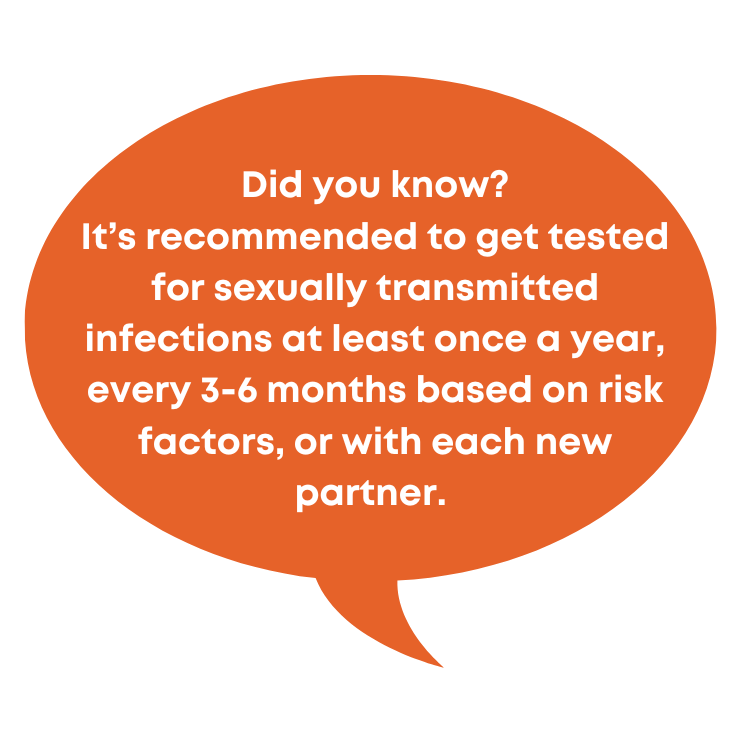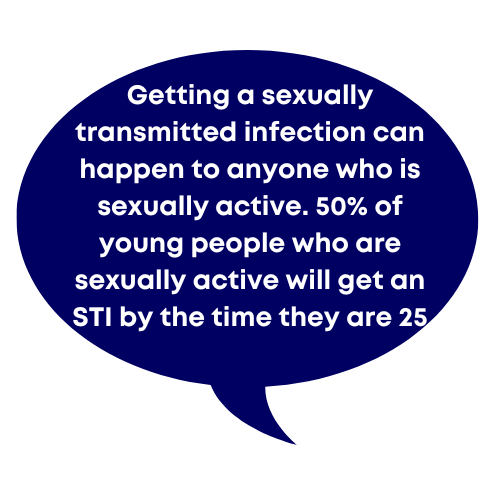
STI Information and Testing in Chaffee County
Find out more about sexually transmitted infections, testing and treatment in Chaffee County today!
Fast and Easy Testing is Available
A healthy sex life includes getting tested!
Test and Treat!
Getting tested for a sexually transmitted infection is easy. Usually testing is just peeing in a cup, performing a self swab, and a finger prick. Get treated quickly and easily based on your results.
FREE
Take ownership of your sexual health! Regardless of your ability to pay, there are lots of options for testing.
Confidential
You don’t have to share the results with anyone if you don’t want to, though we do encourage you to tell your partner. If you test positive, common STIs can usually be treated with antibiotics.
Sooner rather than later
Acting now is better than later. If left undiagnosed, some STIs such as chlamydia can lead to serious conditions when left untreated.
Partner Treatment
If you test positive for a sexually transmitted infection, you partner(s) can get tested and treated as well. For some STIs, your partner can even be treated without needing to get tested.
STI Quick Reference
When to Test and Type of Test
Gonorrhea
More Info
If you are sexually active, get tested:
- Once a year
- With each new partner
- If your partner tests positive
Type of Test
- Pee in a cup and swab
Syphilis
More Info
Get tested once a year if you are are sexually active and:
- have a partner who tested positive,
- men who have sex with men,
- have HIV, or are taking PrEP for HIV.
Pregnant persons should also get tested for syphilis.
Type of Test:
- Finger stick
- A blood draw is required for confirmatory testing
HIV
More Info
Everyone between the age of 13 and 64 get tested once as a part of routine health care. Anyone with the following risk factors should test more often:
- You’re a man who has had sex with another man.
- You’ve had anal or vaginal sex with someone who has HIV.
- You’ve had more than one sex partner since your last HIV test.
- You’ve shared needles, syringes, or other drug injection equipment (for example, cookers).
- You’ve exchanged sex for drugs or money.
- You’ve been diagnosed with or treated for another sexually transmitted disease.
- You’ve been diagnosed with or treated for hepatitis or tuberculosis (TB).
- You’ve had sex with someone who has done anything listed above or with someone whose sexual history you don’t know.
Type of Test:
- Finger stick
- A blood draw is required for confirmatory testing
Chlamydia
More Info
If you are sexually active, get tested:
- Once a year
- With each new partner
- If your partner tests positive
Type of Test
- Pee in a cup and swab
Hepatitis C
More Info
Get tested for Hepatitis C if you are:
- Are 18 years of age and older (only once if no other risk factors)
- Are pregnant (get tested during each pregnancy)
- Currently inject drugs (get tested regularly)
- Have ever injected drugs, even if it was just once or many years ago
- Have HIV
- Have abnormal liver tests or liver disease
- Are on hemodialysis
- Received donated blood or organs before July 1992
- Received clotting factor concentrates before 1987
- Have been exposed to blood from a person who has hepatitis C
- Were born to a mother with hepatitis C
Type of Test:
- Finger stick
- A blood draw is required for confirmatory testing
HPV - Human Papilloma Virus
More Info
Getting tested for HPV happens in a doctor’s office or a clinic like Planned Parenthood and is typically done along with a Pap. Recommendations for testing are:
- How often you get tested depends on your age, medical history, and the results of your last Pap or HPV tests. In general, it’s a good idea to get an HPV test every 5 years if you’re between 25 and 65 years old.
- After age 65, you may not need HPV tests anymore. You may be able to get an HPV test instead of a Pap test.
- Or your nurse or doctor may recommend getting both an HPV test and a Pap test at the same time (called co-testing).
Certain risk factors may need to have more frequent screening or to continue screening beyond age 65. These risk factors include:
- Being infected with the human immunodeficiency virus (HIV)
- Being immunosuppressed
- Having been exposed to diethylstilbestrol before birth
- Having been treated for a precancerous cervical lesion or cervical cancer
Screening for cervical cancer is not recommended for:
- People with a cervix younger than 21 years
- People with a cervix older than 65 years who have had adequate prior screening, with normal results, and who are not otherwise at high risk for cervical cancer
- People with a cervix who have had a total hysterectomy (surgery to remove the uterus and cervix) and have no history of high-grade cervical lesions or cervical cancer
Type of Test:
- Pap (swab of the cervix performed by a health care provider)
Did you know?
Everyone should get tested to get a baseline of your status
Get tested if a partner tests positive for an STI
If you are sexually active and/or use injection drugs, you should get tested at least once a year
When engaging in sex with a new partner, both of you should get tested prior to having sex
Hepatitis C and HIV can both be transmitted during pregnancy and at birth, or through the use of non-sterile or shared needles
Everyone should get tested for Hepatitis C and HIV once in their lifetime (or maybe more!)
An estimated 2.4 million Americans are living with Hepatitis C, yet many do not know they are infected
Though great strides have been made with testing and treatment of HIV, there is still a lot of work to do. Getting tested for HIV is important and current treatment means that many people can live a full and healthy life even with an HIV infection. Get tested once in a lifetime, or more often if you’re sexually active, an injection drug user or men who have sex with men.
STI Testing Locations in Chaffee County
STI Facts
Knowing the facts about sexual health and STIs is important. Check out the STI links listed here to learn more about specific STIs, facts, symptoms, how to protect yourself, testing and treatment.
You can also learn more information and news regarding STIs on the CDC website.



